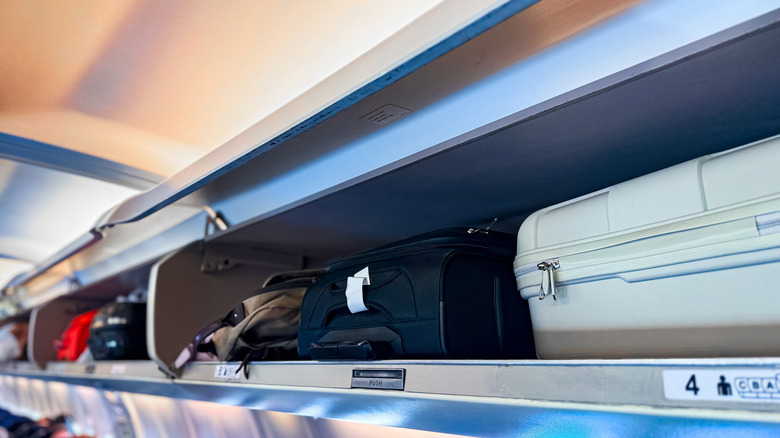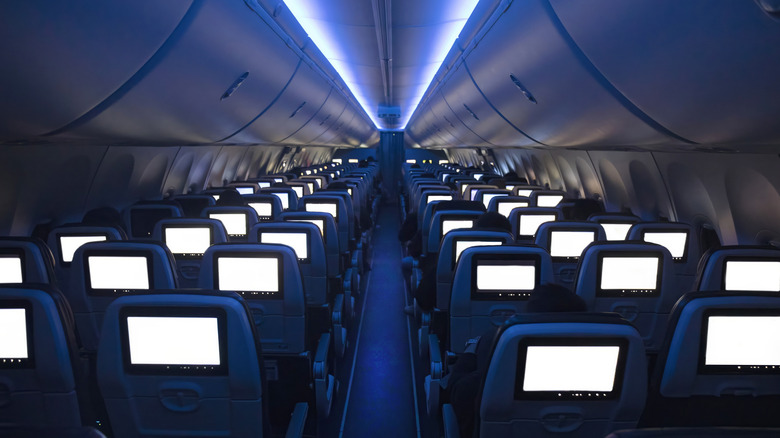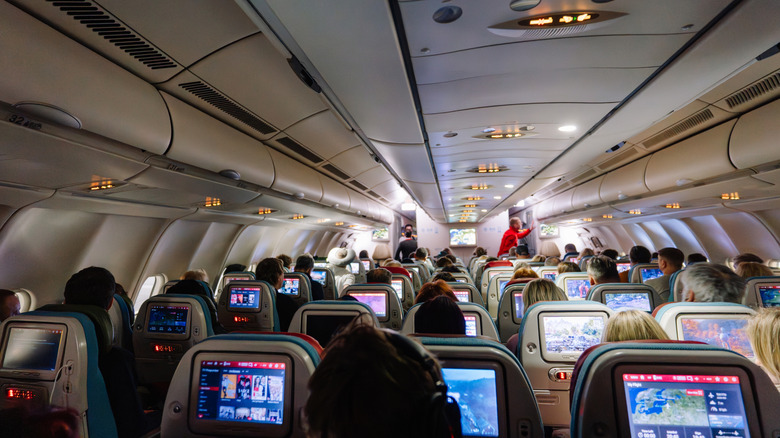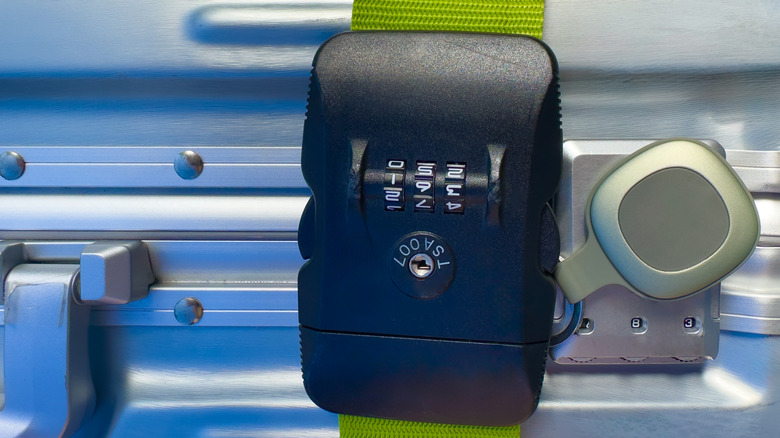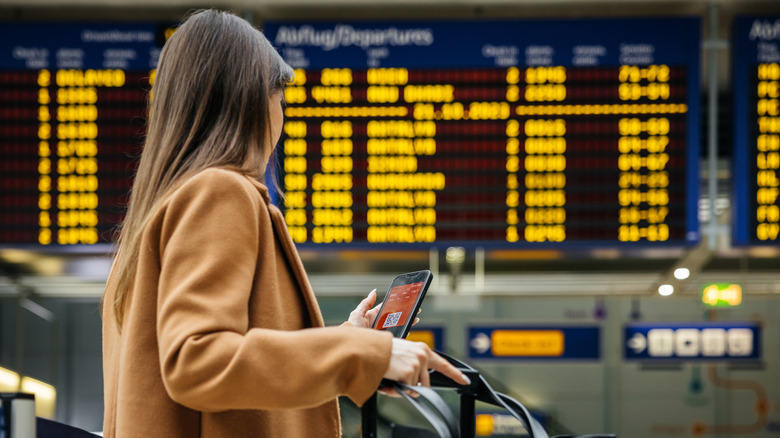In-Flight Theft Is On The Rise, Here's How To Crime-Proof Your Carry On Luggage
We may receive a commission on purchases made from links.
On December 16, 2023, a man on board a Scoot Airlines flight from Ho Chi Minh City to Singapore was arrested after allegedly stealing $23,000 in cash from fellow passengers' overhead bags mid-flight. According to reports, the passenger nabbed Singapore dollars and Vietnamese dong. Thanks to the Tokyo Convention Act, a global treaty from 1963 regarding crimes committed on board international aircraft, the man was sentenced to eight months in jail after pleading guilty to one count of theft in January 2024.
While it's nice that justice was served, every traveler is thinking the same thing — we have to deal with this now? Unfortunately, in-flight theft is having a bit of a day in the sun. A quick search through online travel forums or a glance at global headlines turns up story after story of passengers waking up to missing laptops, cash, jewelry, and even passports. One Reddit user described discovering someone trying to make off with their carry-on bag before confronting them and retrieving it. From Asian budget airlines to U.S. domestic carriers, in-flight theft is on the rise, and it's time travelers took notice.
It's easy to assume your stuff is safe on a pressurized metal tube hurtling through the sky. But that assumption has created the perfect illusion of safety, and savvy bad actors are exploiting it. Distracted, weary passengers, darkened cabins, and a lack of surveillance make for ideal swiping conditions. Here are some tips to help ensure all your belongings arrive at your destination.
How in-flight theft happens, and what thieves are taking
A report by the South China Morning Post stated that from 2023 to 2024, police noted a 75% increase in thefts aboard planes bound for Hong Kong. Unsurprisingly, small luxury items seem to be a major focus for airborne criminals. Watches, handbags, jewelry, and credit cards are all prime targets, with the Hong Kong Police Force reporting a particularly egregious loss of a watch worth over $500,000 on a Swiss International Air Lines flight.
As of 2025, Japanese airlines and travel agencies are warning travelers of theft attempts linked to organized crime syndicates, which could entail individuals operating in pairs to create a distraction while the other rifles through bags. The main strategies they employ are waiting until the cabin lights are dimmed and when passengers are asleep or distracted. At this point a thief might casually open an overhead bin and rummage through the bags. Most travelers assume that anyone reaching into a bin is simply retrieving their own items, and that assumption is all a thief needs to quickly grab an item in a bag (or the bag itself).
This risk gets amplified when passengers are forced to store bags rows away from their seats, leaving them at a disadvantage to keep a direct eye on their belongings. Avoid leaving tech items like laptops, noise-cancelling headphones, and E-Readers unattended. These aren't haphazard grab jobs; they're targeted, selective, and designed to blend in with the normal rhythm of air travel.
How to avoid in-flight theft
When it comes to keeping your belongings safe during a flight, the best defense is a quiet, well-planned offense. For starters, if your carry-on has a lock, make sure you're using it. Instead of placing your bag directly overhead where it might be more vulnerable, place it in the bin across the aisle, where you'll have a clearer line of sight.
Take a page from the all-time classic book of travel advice: Keep your most valuable items on your person. Passports, phones, credit cards, medication, and tech you can fit in your pockets should be with you at all times. Anything you absolutely can't afford to lose should go in a small, zippered bag stowed beneath the seat in front of you. And just like when you're sightseeing, don't flash high-value items like watches, jewelry, or expensive headphones while you're boarding — these are sure to get thieves' attention.
Another smart tip is to store your cash and credit cards separately. If either gets lifted, you'll still have a way to navigate out of the situation. And if you can handle the annoying sounds, consider attaching bells or noisy trinkets to your luggage. If someone tries to make off with it, you'll have an extra sense on your side to keep you alert. The best thing you can do, though, is pay attention. If someone is acting strangely, don't hesitate to flag a flight attendant. A polite (if awkward) confrontation is better than losing your bag.
Gear designed to stop in-flight theft
Once you've dialed in your strategy, the next step is making sure your gear works to keep your things, well, yours. Not all carry-on luggage is created equal, and a few small upgrades can significantly reduce your risk of becoming an in-flight statistic. TSA-approved locks are a must-have to keep your bag sealed and create a visual deterrent. Look for ones with flexible cables, like the TSA-Approved Lumintrail Combination Lock, which are easier to loop through different zipper and handle configurations.
If you're concerned about sensitive items like passports or credit cards, an RFID-blocking pouch is another smart investment. The Zero Grid Travel Wallet is a great example of a passport and card carrier that prevents radio frequency identification (RFID) scanning by bad actors trying to steal your private information.
If you're someone who nods off during flights, think about keeping your valuables in a discreet under-clothing pouch like the Venture 4th Travel Money Belt, which comes with RFID blocking for extra protection. It's got total fanny pack vibes, and we love it all the more for that. It's good for storing anything you don't want slipping out of your pockets or getting nabbed while you're asleep on that 13-hour haul across the ocean. If this all seems a bit techy, remember that none of these tools are overkill. They're practical, low-profile ways to protect your stuff, especially when paired with a healthy skepticism of anyone lurking too long near the overhead bins.
Stay alert and stay secure on your next flight
Air travel demands a mental checklist — tickets, passport, liquids, how to avoid seemingly normal behaviors that make the TSA watch you like a hawk — and now, people trying to steal your stuff. In-flight theft isn't a widespread epidemic, but it's happening often enough to warrant a shift in mindset. Your airline will get you from point A to point B, but when it comes to your belongings, the responsibility falls on you.
Unfortunately, some of the testimonies from those who have experienced in-flight theft relate how unenthusiastic the airline was about filing a report or getting to the bottom of the matter. The case about the man on the Scoot Airlines flight receiving jail time for stealing cash on board is absolutely the exception and not the rule. Put together, this means staying alert during quiet stretches of a flight (as well as during boarding and disembarking), placing your luggage carefully, having the necessary tools to minimize risk, and reporting shady behavior.
At the end of the day, staying vigilant is more empowering than paranoia. The goal isn't to travel in fear, it's to travel smart. If you've spent the time and money planning your dream vacation or family visit, then a little extra attention (and intention) can go a long way. And if you're all set on the security front, check out our guides to skipping long airport security lines and airport hacks that can help you zip through TSA.
